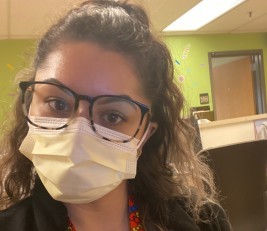
Jump in, the water's fine: Labor pools, like this one in the Northwest region, help deploy the right people to the right places to fight COVID-19.
Labor pools fill staffing gaps
COVID-19 is testing partnership as never before.
Management and labor have had to work together quickly to retool the delivery system to support rapidly changing needs. Employees’ and physicians’ skills and talents are needed in new ways and in new places — so leaders from Kaiser Permanente and unions created labor pools to get KP employees to where they were needed.
It’s one of dozens of innovations made to provide top-quality care at a time when every day is bringing new challenges. The swift work was possible in part because of the foundation provided by the relationships and values of the Labor Management Partnership.
In Southern California's Riverside service area, “It’s all-hands on deck,” says Jiji Abraham, area chief financial officer. “Even physicians are in the labor pool.”

Be open about getting deployed.
Matching skills to needs
A labor pool creates a centralized place where workers can be matched to jobs that need their particular skills. Amid social distancing, the pools are going virtual.
Southern California has regional and local pools for KP employees. Riverside’s pool is operated by a labor-management team comprising hospital administrators and representatives from Steelworkers Local 7600, UNAC/UHCP and SEIU Local 121RN. With elective surgeries postponed and many outpatient clinics temporarily closed, Kaiser Permanente and union leadership agreed on increased flexibility to combat this crisis.
For instance, licensed vocational nurses from Riverside’s outpatient pediatric clinic are helping in the Emergency Department. “The nurses and staff were very friendly and open to teaching me about the ED and the process of how they triage,” says LVN Monica Moul, a member of Steelworkers Local 7600. “My advice to everyone: Be open about getting deployed. It might not be as bad as everyone thinks.”
Common cause
In Georgia, management and union leaders are preparing for a labor pool if needed. Management has surveyed employees with medical licenses to assess the response capacity, says Shankar Viswanathan, the region’s director of employee and labor relations and LMP management co-lead. Managers join in for parts of UFCW Local 1996 all-steward calls to update union members.
“Communication is totally transparent on both sides,” says Rick Brown, executive assistant to the president of UFCW Local 1996. “If management hears something, they will give us a heads up, and if we hear something first, we will let them know."
Not all redeployments have gone smoothly.
“There were at least 1 or 2 areas we worked in partnership to redeploy staff, but more often we were told how it was going to be and had to invoke our contract around redeployment in regards to seniority,” says Joan Heller, chief steward for UFCW Local 7 in Colorado.
Early missteps, however, can be recovered with a foundation of trust.
The Northwest region had redeployed about 750 workers as of mid-April. “I have been at the table with some of the [union] leaders, and we’ve talked about burdens and elevated concerns,” says Michelle Teeples, interim senior director for mental health, who is leading the effort there. “We asked, ‘Where did we go wrong? Let’s re-work it.’ In true LMP form, I believe some of the best collaboration has come out of this.”
With reporting by Jennifer F. Bellisario, Sherry Crosby, Alec Rosenberg and Tracy Silveria.
